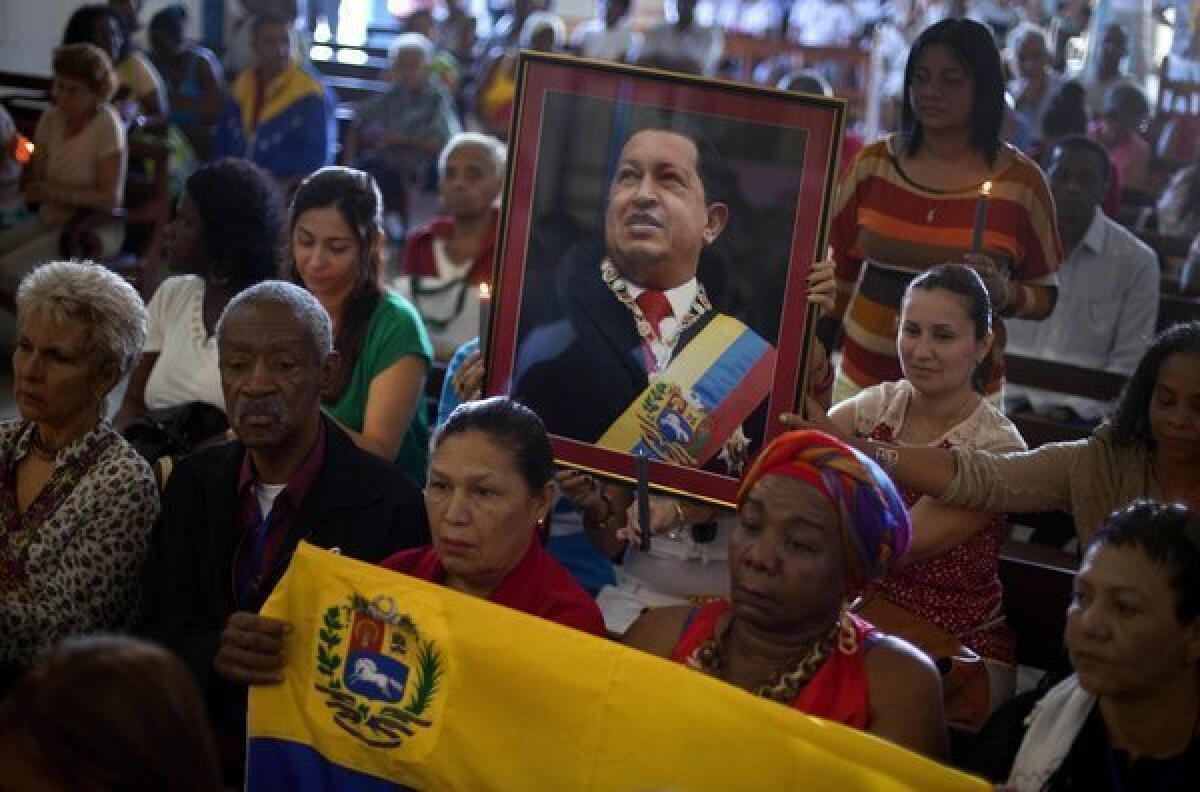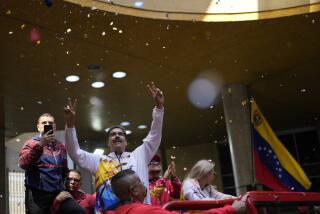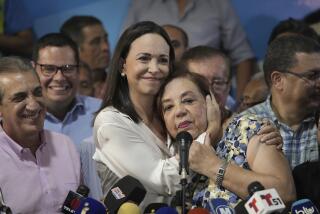Chavez inauguration delay legal, Venezuela high court says

CARACAS, Venezuela -- To no one’s great surprise, Venezuela’s Supreme Court ruled unanimously Wednesday that cancer-stricken Hugo Chavez does not have to take the oath of office Thursday to begin his fourth term has president, a finding that some legal experts assailed as unconstitutional.
In a news conference Wednesday, Court President Luisa Estela Morales said Chavez’s absence is acceptable because it is neither “temporary nor permanent” given that his service will be uninterrupted and therefore does not fall under constitutional guidelines that could have forced Chavez to be present for the swearing-in ceremony or relinquish power.
The Venezuelan Constitution calls for presidents to be sworn in at the National Assembly on Jan. 10, but also provides for the alternative of the Supreme Court conducting the inauguration “if for any unforeseen reason” the congressional ceremony cannot take place.
To have the Supreme Court administer the oath or delay the swearing-in, the president-elect must ask for a temporary postponement. Government officials say Chavez is conscious and in possession of his mental faculties.
But Chavez, who is suffering from “respiratory insufficiency,” has not been seen or heard from since his Dec. 11 surgery. Some here think that could mean he is comatose and thus unable to govern, which would require a new presidential election.
“Although Jan. 10 marks the beginning of a new constitutional period, a new swearing in of the president is not necessary in [Chavez’s] status as president-elect because there is no interruption in the exercise of his authority,” Morales said. Chavez “is not a new president who has to take possession, he is the president whose performance has been approved by the people.”
Constitutional law expert Armando Rodriguez Garcia said there were “inconsistencies” in the ruling, saying the constitutional clause requiring the oath “covers the institution, not the person.” Chavez’s current presidential term and thus his authority ends Thursday and he must be sworn in to resume it, the professor said.
“If Chavez is unable to be sworn in tomorrow, then power must transfer to the legislative branch in the person of the president of the National Assembly so that there is no power vacuum,” said Rodriguez Garcia, who was one of 38 constitutional law professors who signed a petition Tuesday warning that Chavez’s absence from the ceremony would be unconstitutional.
The court’s ruling followed the decision by the National Assembly on Tuesday to give Chavez permission to be away in Cuba indefinitely while he recovers from his fourth cancer surgery in 19 months. The exact type of his cancer has not been publicly divulged.
The Supreme Court denied a motion by opposition figures that it set up a medical team to evaluate Chavez’s physical and mental state in Cuba, where he is recuperating.
Chavez himself raised the prospect that he might not return from this latest setback. On the eve of his Dec. 9 departure for Havana, a visibly despondent Chavez designated Vice President Nicolas Maduro as his political heir and favored candidate should new elections be held.
But Maduro’s term as vice president ends tomorrow as well, as do those of the rest of Venezuelan cabinet officials. According to the constitution, Maduro and other officials cannot assume those high offices unless a legally sworn-in president appoints them.
ALSO:
Syrian rebels free 48 Iranians in prisoner swap
China officials, Southern Weekly staff end censorship standoff
Google this: North Korea open to Western help with Net upgrade?
More to Read
Start your day right
Sign up for Essential California for news, features and recommendations from the L.A. Times and beyond in your inbox six days a week.
You may occasionally receive promotional content from the Los Angeles Times.





